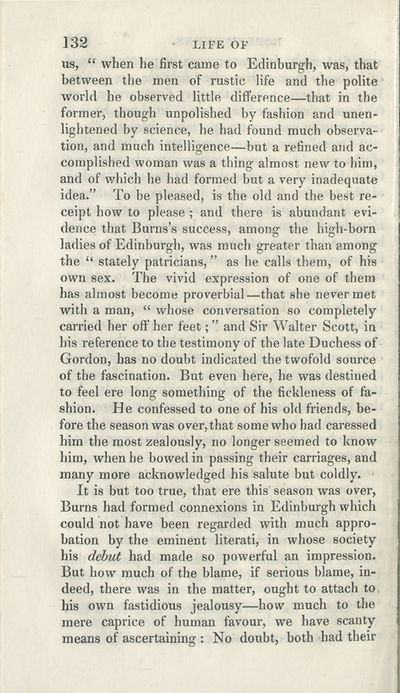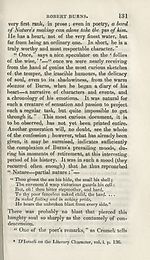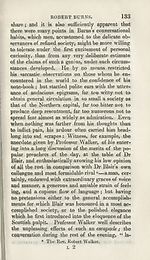Scotland/Scots > Life of Robert Burns
(142)
Download files
Complete book:
Individual page:
Thumbnail gallery: Grid view | List view

132 LIFE OF
us, “ when he first came to Edinburgh, was, that
between the men of rustic life and the polite
world he observed little difference—that in the
former, though unpolished by fashion and unen¬
lightened by science, he had found much observa¬
tion, and much intelligence—but a refined and ac¬
complished woman was a thing almost new to him,
and of which he had formed but a very inadequate
idea.” To be pleased, is the old and the best re¬
ceipt how to please ; and there is abundant evi¬
dence that Burns’s success, among the high-born
ladies of Edinburgh, was much greater than among
the “ stately patricians, ” as he calls them, of his
own sex. The vivid expression of one of them
has almost become proverbial—that she never met
with a man, “ whose conversation so completely
carried her off her feet; ” and Sir Walter Scott, in
his reference to the testimony of the late Duchess of
Gordon, has no doubt indicated the twofold source
of the fascination. But even here, he was destined
to feel ere long something of the fickleness of fa¬
shion. He confessed to one of his old friends, be¬
fore the season was over, that some who had caressed
him the most zealously, no longer seemed to know
him, when he bowed in passing their carriages, and
many more acknowledged his salute but coldly.
It is but too true, that ere this season was over,
Burns had formed connexions in Edinburgh which
could not have been regarded with much appro¬
bation by the eminent literati, in whose society
his debut had made so powerful an impression.
But how much of the blame, if serious blame, in¬
deed, there was in the matter, ought to attach to
his own fastidious jealousy—how much to the
mere caprice of human favour, we have scanty
means of ascertaining : No doubt, both had their
us, “ when he first came to Edinburgh, was, that
between the men of rustic life and the polite
world he observed little difference—that in the
former, though unpolished by fashion and unen¬
lightened by science, he had found much observa¬
tion, and much intelligence—but a refined and ac¬
complished woman was a thing almost new to him,
and of which he had formed but a very inadequate
idea.” To be pleased, is the old and the best re¬
ceipt how to please ; and there is abundant evi¬
dence that Burns’s success, among the high-born
ladies of Edinburgh, was much greater than among
the “ stately patricians, ” as he calls them, of his
own sex. The vivid expression of one of them
has almost become proverbial—that she never met
with a man, “ whose conversation so completely
carried her off her feet; ” and Sir Walter Scott, in
his reference to the testimony of the late Duchess of
Gordon, has no doubt indicated the twofold source
of the fascination. But even here, he was destined
to feel ere long something of the fickleness of fa¬
shion. He confessed to one of his old friends, be¬
fore the season was over, that some who had caressed
him the most zealously, no longer seemed to know
him, when he bowed in passing their carriages, and
many more acknowledged his salute but coldly.
It is but too true, that ere this season was over,
Burns had formed connexions in Edinburgh which
could not have been regarded with much appro¬
bation by the eminent literati, in whose society
his debut had made so powerful an impression.
But how much of the blame, if serious blame, in¬
deed, there was in the matter, ought to attach to
his own fastidious jealousy—how much to the
mere caprice of human favour, we have scanty
means of ascertaining : No doubt, both had their
Set display mode to:
![]() Universal Viewer |
Universal Viewer | ![]() Mirador |
Large image | Transcription
Mirador |
Large image | Transcription
| Antiquarian books of Scotland > Scotland/Scots > Life of Robert Burns > (142) |
|---|
| Permanent URL | https://digital.nls.uk/108247563 |
|---|
| Description | Thousands of printed books from the Antiquarian Books of Scotland collection which dates from 1641 to the 1980s. The collection consists of 14,800 books which were published in Scotland or have a Scottish connection, e.g. through the author, printer or owner. Subjects covered include sport, education, diseases, adventure, occupations, Jacobites, politics and religion. Among the 29 languages represented are English, Gaelic, Italian, French, Russian and Swedish. |
|---|

